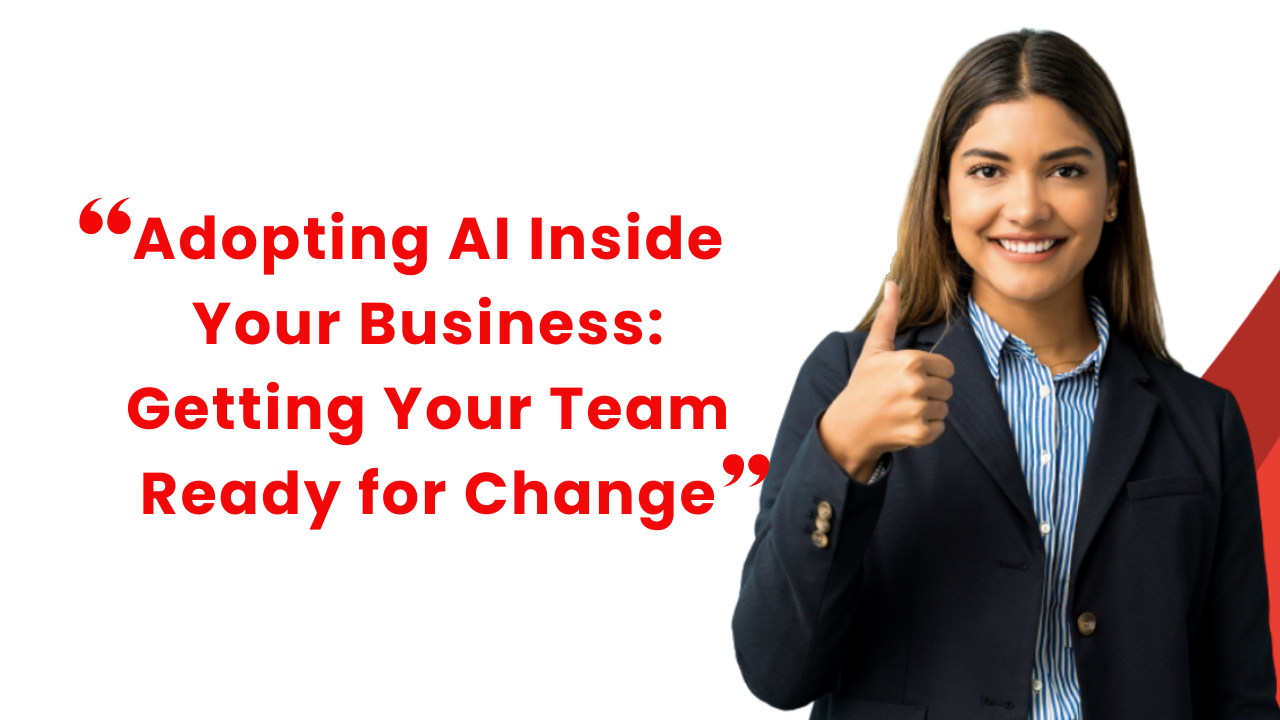Integrating Artificial Intelligence (AI) into your business operations represents a transformative leap into the future of efficiency and innovation. Preparing your team for this paradigm shift is essential in the dynamic landscape of technological advancements. “Adopting AI Inside Your Business: Getting Your Team Ready for Change” delves into the crucial aspects of this transition. This comprehensive guide navigates the intricate terrain of AI implementation, addressing the significance of team readiness. From fostering a culture of adaptability to upskilling initiatives, the article explores strategies to align your workforce with the potential of AI. By understanding the nuanced dynamics involved, businesses can embrace change and empower their teams to thrive in an AI-driven era, fostering a synergy that propels both organizational success and individual growth.
Why Should Businesses Consider Taking Advantage of AI?
Embracing Artificial Intelligence (AI) is no longer a choice but a strategic imperative for businesses aiming to thrive in the digital age. Here are key reasons why companies should harness the power of AI:
Enhanced Efficiency: AI automates routine tasks, streamlining operations and allowing employees to focus on more strategic endeavors.
Data-Driven Decision-Making: AI analyzes vast datasets at remarkable speeds, providing actionable insights that facilitate informed and data-driven decision-making.
Improved Customer Experience: AI-driven chatbots, personalization algorithms, and predictive analytics enhance customer interactions, fostering satisfaction and loyalty.
Cost Reduction: AI optimizes resource allocation, reducing operational costs through automation and increased efficiency.
Competitive Advantage: Businesses leveraging AI gain a competitive edge by staying ahead in technological advancements and adapting to market trends swiftly.
Innovation Catalyst: AI sparks innovation by enabling the development of new products, services, and business models, fostering a culture of continuous improvement.
In summary, integrating AI empowers businesses to be more agile, customer-centric, and competitive in an ever-evolving marketplace.
Assessing the Return on Investment (ROI) and Identifying Risks in Integrating Artificial Intelligence into Your Business Strategy
Integrating Artificial Intelligence (AI) into your business requires a nuanced understanding of its Return on Investment (ROI) and associated risks. Here’s a concise overview:
ROI of AI:
Increased Efficiency: AI automates tasks, reducing operational costs and boosting overall efficiency.
Data-Driven Insights: AI enables better decision-making by analyzing large datasets uncovering valuable insights.
Enhanced Customer Experience: AI-powered personalization and predictive analytics contribute to improved customer satisfaction and loyalty.
Competitive Advantage: Businesses leveraging AI gain a strategic edge by staying innovative and agile in a rapidly changing market.
Risks Associated:
Data Security Concerns: Handling sensitive data poses potential risks, requiring robust cybersecurity measures.
Implementation Costs: Initial setup and training costs can substantially impact short-term financials.
Ethical Considerations: Ensuring responsible AI usage, free from biases, is crucial to maintaining trust and reputation.
Employee Resistance: Overcoming resistance to change and upskilling challenges among employees during implementation.
Understanding the delicate balance between the returns and risks of AI implementation is vital for businesses seeking to harness its transformative potential effectively.
Cultivate Partnerships with AI Adoption and Implementation Specialists to Enhance Expertise
Establishing robust relationships with AI experts is paramount for businesses venturing into adoption and implementation. Here’s why building connections with these specialists is essential:
In-Depth Knowledge: AI experts bring extensive knowledge about the technology, its applications, and evolving trends, providing valuable insights for informed decision-making.
Customized Solutions: Collaborating with AI specialists allows businesses to tailor solutions to their unique needs, ensuring the most effective implementation strategies.
Navigating Challenges: Experts offer guidance in navigating the challenges associated with AI adoption, such as data security, ethical considerations, and regulatory compliance.
Continuous Learning: The field of AI evolves rapidly; maintaining relationships with experts ensures businesses stay abreast of the latest advancements and best practices.
Optimized ROI: Leveraging the expertise of AI professionals enhances the likelihood of a successful implementation, optimizing the return on investment for the business.
By fostering strong ties with AI experts, businesses position themselves to navigate the complexities of AI adoption confidently, fostering innovation and sustainable growth.
Key Measures for Readying Your Business for the Adoption of AI
Preparing for adopting Artificial Intelligence (AI) in your business involves strategic planning and execution. To facilitate a seamless shift, consider the following key steps:
Assess Business Needs: Identify areas where AI can add value, addressing operational inefficiencies or enhancing customer experiences.
Cultivate AI Awareness: Educate your team about AI’s capabilities and potential impact, fostering a culture of curiosity and adaptability.
Data Readiness: Ensure your data infrastructure is robust, clean, and accessible. High-quality data is essential for AI algorithms to deliver accurate insights.
Security Measures: Implement robust cybersecurity protocols to safeguard sensitive data, addressing potential risks associated with AI adoption.
Skills Development: Invest in training programs to upskill existing employees or hire talent with AI expertise, ensuring your team can work alongside AI technologies.
Start Small, Scale Gradually: Begin with pilot projects to test AI applications before full-scale implementation, allowing for adjustments and minimizing potential risks.
Vendor Selection: Choose reliable AI vendors or partners, considering their expertise, track record, and compatibility with your business goals.
By systematically addressing these steps, businesses can lay a solid foundation for successful AI adoption, unlocking the transformative potential of artificial intelligence in their operations.
What Soft Skills Will Employees Need In Growing Domain Of Artificial Intelligence
As the domain of Artificial Intelligence (AI) continues to grow, certain soft skills are becoming increasingly crucial for employees. Here are key soft skills essential for navigating the AI landscape:
Adaptability: Employees need to embrace change, as AI technologies evolve rapidly, requiring a constant willingness to learn and adapt.
Critical Thinking: The ability to analyze complex situations, understand AI outputs, and make informed decisions is vital in the context of AI-driven insights.
Creativity: Despite AI’s analytical capabilities, human creativity remains unmatched. Employees who can ideate and innovate will contribute significantly to AI-driven projects.
Collaboration: Working effectively with AI systems and diverse teams is essential. Employees must seamlessly integrate their skills with AI technologies to achieve optimal results.
Communication: Clear and concise communication skills are vital for explaining AI findings, insights, and recommendations to non-technical stakeholders.
Ethical Judgment: Employees should possess ethical awareness to navigate the responsible and unbiased use of AI, ensuring fair and equitable outcomes.
Emotional Intelligence: Understanding and interpreting human emotions is a skill AI lacks. Employees with high emotional intelligence can enhance interpersonal relationships and customer interactions.
By cultivating these soft skills, employees can thrive in the expanding domain of AI, contributing meaningfully to its integration and ensuring a harmonious collaboration between human expertise and artificial intelligence.
The challenges of AI adoption in the business world
The widespread adoption of Artificial Intelligence (AI) in the business world presents various challenges that organizations must navigate. Key obstacles include:
Cost Implications: Implementing AI systems can be expensive, involving significant upfront costs for technology, training, and infrastructure.
Data Privacy and Security: Handling vast amounts of sensitive data raises concerns about privacy and the potential for security breaches, necessitating robust safeguards.
Skills Gap: There is a shortage of professionals with expertise in AI, leading to a skills gap that organizations must address through training or hiring.
Ethical Concerns: The ethical use of AI, including issues related to bias and fairness, requires careful consideration to avoid negative societal impacts and maintain trust.
Integration Complexity: Integrating AI with existing systems can be complex, requiring seamless compatibility and sometimes necessitating redesigning business processes.
Regulatory Compliance: Adhering to evolving regulations and standards in AI poses challenges for businesses, particularly in industries with stringent compliance requirements.
Navigating these challenges requires a holistic approach, encompassing strategic planning, ethical considerations, and ongoing adaptation to the evolving landscape of AI technologies.
Conclusion
In conclusion, adopting Artificial Intelligence (AI) inside your business is not just about embracing cutting-edge technology; it’s a transformative shift that necessitates preparing your team for change. By delving into the intricacies of AI integration, from fostering adaptability to implementing strategic upskilling initiatives, businesses can pave the way for a seamless transition. Cultivating a culture that embraces innovation and continuous learning cannot be overstated. As AI becomes an integral part of the business landscape, your team’s readiness becomes a determining factor in unlocking the full potential of this powerful technology. Ultimately, the success of AI adoption rests not only on the technology’s sophistication but also on the team’s collective ability to embrace and leverage its capabilities, ensuring a future where AI augments human potential, fostering growth and innovation.





